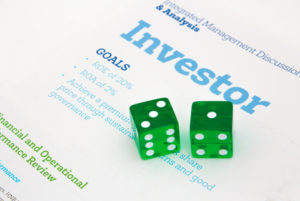In the minds of many consumers there is decidedly no difference between investing in the stock markets and gambling – in several ways they are right. But such a simplistic analysis ignores some very  important distinctions.
important distinctions.
Dictionary definitions of the two activities are unhelpful because they are mostly ambiguous. “To take a risk in the hope of gaining an advantage” and “To commit money in order to gain a financial return” could equally apply to both. This piece does not address the merits and demerits of whether or not investing is socially beneficial and/or gambling is morally wrong. It is more concerned with teasing out the discrepancies.
Investments might be defined as gambles where the odds are tilted in the investors’ favour – or more correctly where investors have identified the breakeven risk-reward point. But gamblers who study form or remember number sequences in casinos might also lay claim to have identified more favourable odds!!
MMPI believes that the crucial difference lies in one’s attitude to risk. Risk-taking is an intrinsic element of any decision to invest or to gamble. There is a tiered risk-scale available to investors to assist them in understanding the exposures being undertaken. If properly constructed, this risk-scale provides investors with an ideal opportunity to differentiate themselves from gamblers. No such acceptable risk measure is available to gamblers although individuals do have their favourite betting strategies.
For example, using the MMPI risk-scale 1-7 investors have the ability to determine which pot safely suits them. The categories are Ultra Safe; Careful; Conservative; Balanced; Growth; Adventurous; Speculative. Using such measurements, it becomes clear that outright gambles belong in the speculative category and not, say, in the balanced category. The ability to assess risk in a precise way is a tremendous safeguard against the charge that all investing in the stock markets is akin to gambling.
Gambling can be addictive and socially destructive. However, some professionals, who treat it as a risk-management exercise, may excel at it – but they are in the minority. Professional gamblers retain the necessary skills and personal attributes to navigate the emotional challenges and determine a successful outcome.
There is little doubt that investing can be similarly addictive. Online opportunities exist with equal abandon and the same cautionary warnings apply. There are professional investors just like professional gamblers – (Maybe they’re the same people! – Ed). But for most consumers the notion of speculative investing in category 7 is pure gambling – and rightly so.
A further significant difference between investing and gambling is sound investment advice – as provided by MMPI. Professional face-to-face investment advice is a tremendous boon to consumers. Without it consumers may ignore highly suitable investment opportunities but worse; consumers may inadvertently drift into a higher risk category by following a tip from others; e.g. “your money is always safe in bank shares.” Nothing beats good investment advice but it has to be face-to-face. Communicating with machines or human automatons is synonymous with staring longingly at a slot machine hoping for the winning combination.

